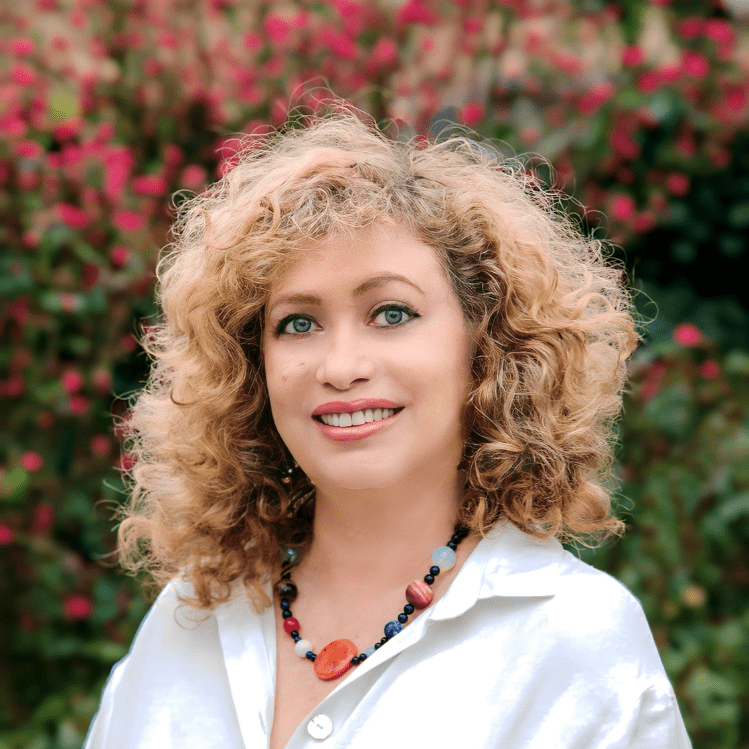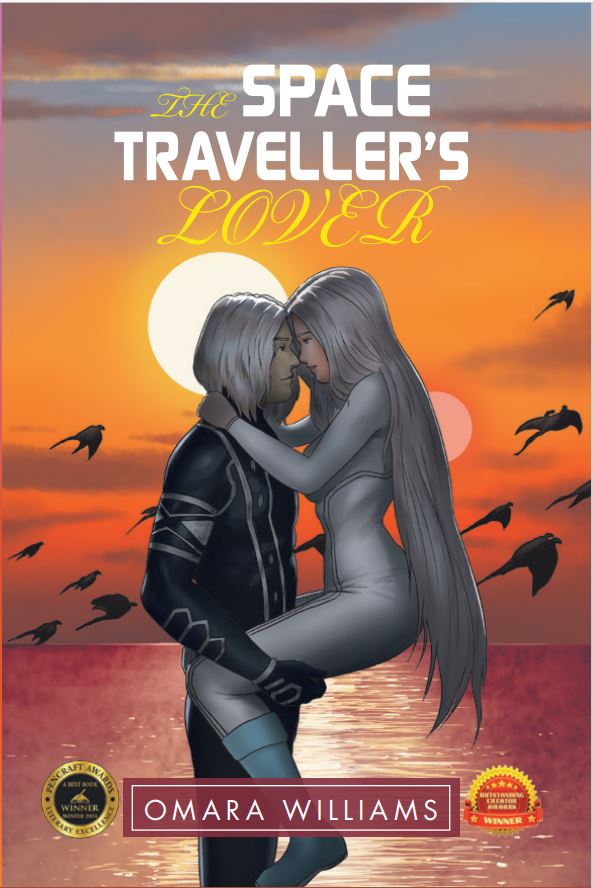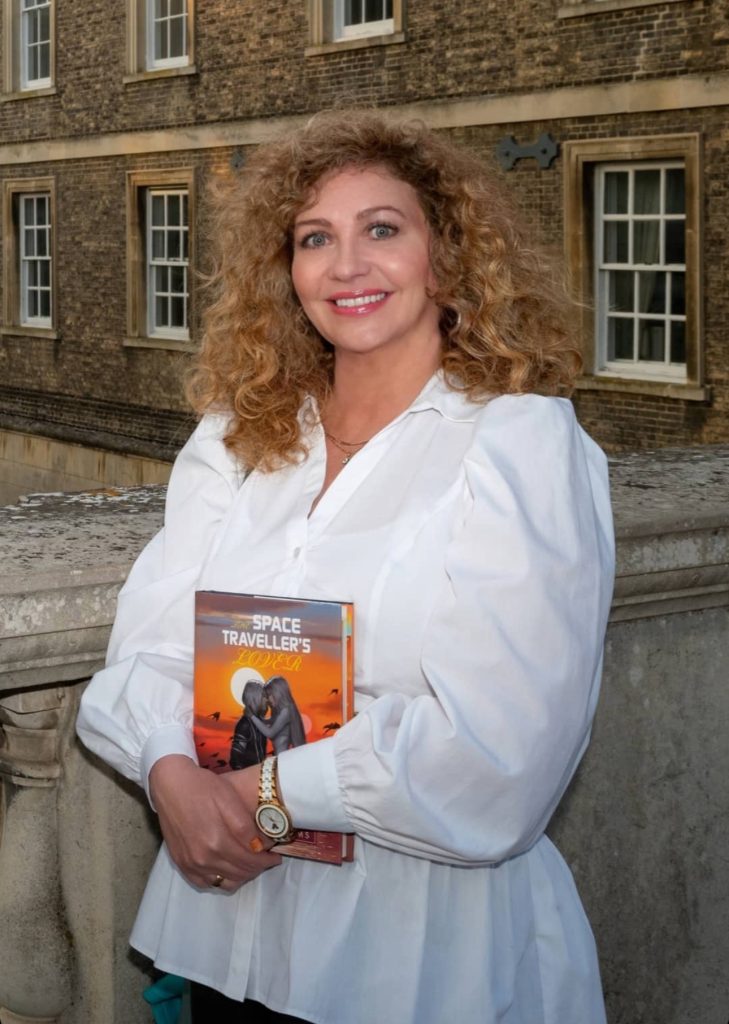
Love Has Truly Conquered All For Award-Winning Author Omara Williams
Growing up in a communist country, multi-award-winning sci-fi romance author Omara Williams could only hope that one day she’d have the freedom to pursue her own intellectual and creative ambitions. Love ultimately held the key, as in her novel The Space Traveller’s Lover.
It’s no exaggeration – and entirely fitting – that readers and critics alike have fallen for author Omara William’s debut novel, sci-fi romance The Space Traveller’s Lover, since its release two years ago.
For its gripping and emotionally charged story, centred around a complex relationship between a human woman and an alien invader – on a mission to plunder her home planet, no less – is the very definition of ‘earth-shattering love’.
And though the book marked her literary debut, Williams proved herself from the off with a story that was spectacular and smouldered at the same time, and which appealed as much to the head as the heart, with its intelligent exploration of themes including the meanings of identity and loyalty, and the pressing concern of climate change.
The Cambridge-based author also showed that when it came to building a realistic future world, underpinned by science rather than fantasy, she could hold her head just as high as esteemed hard sci-fi authors such as Arthur C. Clarke.
This has led to an army of fans around the world hooked on the drama and dilemmas facing protagonist Erin as she battles her attraction to steely Rothwen, the vanguard master navigator of the Rom-Ghenshar invasion fleet.
There has also been a slew of prestigious awards for the novel, including winner of the BookFest Award, the PenCraft Best Book Award and the Outstanding Creator Award in the Science Fiction – Romance category.
But the notion central to The Space Traveller’s Lover and its magnetic power couple – that love can conquer all – is more than plot on a page. It’s a belief that Omara holds fast too, and which has ultimately proven right more than once in the author’s life.
Though she has lived in the UK for more than 30 years, Omara was born in Cuba during the height of the Communist regime.
In some sense, the harsh environment she grew up in – marked by oppression, hardship, and paranoia – seems as alien to Western readers as descriptions of the Rom-Ghenshar’s homeworld.
“Cuba was not a happy place to grow up,” remembers Omara of her upbringing in the city of Santiago de Cuba.
“The basic necessities of life – food, clothing – were scarce, and blackouts were common.
“What, perhaps, was worse was that I couldn’t say that I was hungry, not even to my parents, because there was always the risk that word would travel that I was criticising the Communist system.
“It was an environment of fear, and I always remember my mother telling me to keep my voice down in case the neighbours heard what I was saying.”

Omara Williams’ award-winning sci-fi romance novel gets straight to the heart of what makes us truly human. An unmissable read and one perfect for big-screen adaptation.
Rather than dwell on the situation, Omara, the daughter of a university professor, found escape through three things that would become abiding passions: science, literature and music.
“I was always reading. Some days, my father would leave for work at 8 am and be amazed to find me still immersed in a book when he returned at 5 pm.
“I loved sci-fi in particular: the works of Jules Verne, Arthur C. Clarke, and Isaac Asimov. It was my way of leaving, if only temporarily, the stresses of a country that seemed more like a jail.
“Music was my other escape. I adored bands such as The Beatles and their message that ‘all you need is love’.
“It was inspirational, though Western music was banned in Cuba from time to time, so I had to listen secretly through a short-wave radio that a neighbour had made himself.”
Through the radio, and especially The Beatles, Queen and Pink Floyd, Omara became an Anglophile and dreamed of one day visiting the UK. However, the prospects of doing so in an isolated regime like Cuba were slim at best.
During the course of her education, English lessons – a symbol of the decadent, non-Communist West – were removed from classrooms in favour of Russian. Despite this, she continued to study the language by herself, almost expelled from school several times for not aligning with the strict communist ideology.
She only escaped expulsion because of her academic gifts, which saw her sail through college and graduate from Havana University with a degree in Nuclear Engineering.
After completing her degree, she progressed to post-graduate study in nuclear physics and mathematical modelling, helping create the sophisticated software that would run the reactor in Cuba’s first nuclear power plant.
Employed by her university, her goal was to remain in academia, where there were more career progression opportunities as well as intellectual challenges to savour.
But by the close of the ‘80s, the once-mighty Soviet Union was struggling on the world stage and, subsequently, the funding underpinning her research was drying up. Losing her post, she was sent to work at the nuclear plant being built in the city of Cienfuegos.
This, however, did not bring the same mental stimulation she relished. “There was no longer any chance for learning,” she recalls. “I’m someone who is infinitely curious but was back in a system that does not like independent thought. I was little more than another cog in the machine. It was disheartening.”
It was at this time, in the early 1990s, that Omara happened to meet the British man who would go on to change the course of her life.
“I was walking back from the beach on a rare weekend break when a man driving by stopped the car.
“I could tell by the car’s number plate that the driver was a tourist, but when he told me he was English, I couldn’t believe it. British visitors to Cuba were so rare I’d never met one before.
“We struck up a conversation and went to a few more beaches together. He had to return to England soon after, but we kept in touch by writing letters.”
Later that same year, he brought marriage papers with him, and after tying the knot, Omara had no hesitation in relocating to the UK with her husband.
Given her academic background, she soon found employment and went on to become one of the UK’s most sought-after software engineering managers, working for Pfizer, GlaxoSmithKline, PerkinElmer, and Linx Printing Technologies.
“I love the challenge of each new project,” she says. “I’ve led teams of engineers building specialised applications used in the drug discovery process and implementing solutions to complex problems in industrial inkjet printing. The more complicated the task, the better!”

Omara Williams counts writing young adult sci-fi romance The Space Traveller’s Lover as one of the greatest intellectual challenges she’s faced, and one of the most rewarding.
It’s not surprising to learn that outside of work, Omara enjoys unwinding with more heady hobbies such as astronomy, regularly jetting off around the world skywatching or chasing total solar eclipses.
But, for her, the greatest satisfaction has come through her novel, The Space Traveller’s Lover. Not just because it fulfils a dream of following in the footsteps of her sci-fi literary heroes but also because it gave her the chance to put her mastery of English – a second language to the native Cuban Spanish speaker – to the test.
And putting together a story that pits the essence of humanity, as reflected in the novel’s young protagonist Erin, against the machine-like, dehumanised Rom-Ghenshar invasion, flowed from her pen, given her formative experiences.
“Writing a novel in English, and for it not only to read well but to be acclaimed, has been tremendously satisfying.
“The Space Traveller’s Lover has been something I’ve wanted to write for a long time, though it took many years to build up the courage to attempt it.
“My aim was always to tell an epic story of love versus war, the power of human emotion against cold and dispassionate logic, and to draw upon my fascination with the universe.
“If I’d remained in Cuba, I don’t think I’d ever have written it, and perhaps I might not have been allowed to publish even if I had.
“But like The Beatles sang to me when I was a child, love is all you need. I held on to that belief, and thankfully, it’s been proven true time and again across my life.”
The Space Traveller’s Lover by Omara Williams is available on
in hardcover, paperback, and eBook formats, priced at £27.99, £13.95, and £2.99 respectively.
Visit www.omarawilliamsbooks.com
You can also follow Omara Williams on Twitter @williams_omara, and on Facebook or Instagram at @OmyWilliams.
APPLY TODAY
100 Top Global Women Entrepreneurs – Global Woman Magazine
Our Journey in 12 Months:
Our Journey in 12 Months – Global Woman Magazine
5 Things That Show Money is Not Evil:
5 Things to Show That Money Is Not Evil – Global Woman Magazine
Global Man Magazine Page:
Global Woman, Global Man: Socials:
Global Woman Magazine (@global_woman.magazine) • Instagram photos and videos





